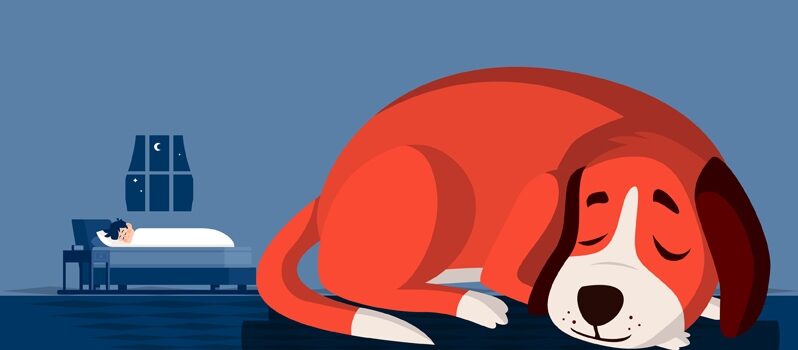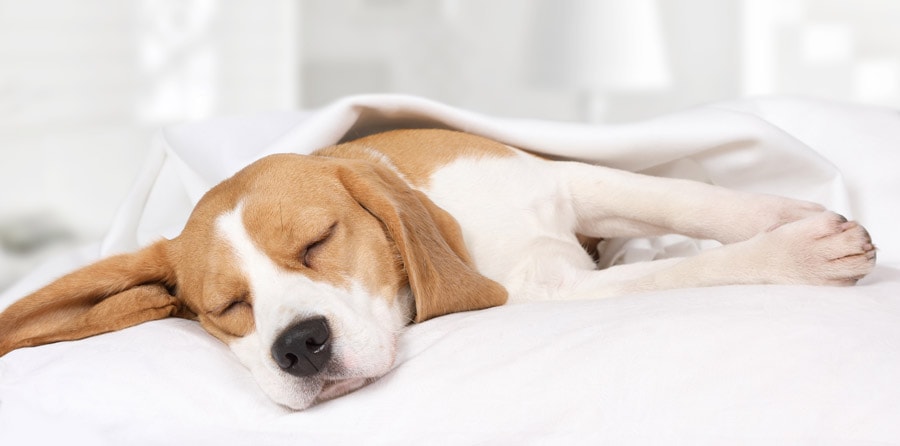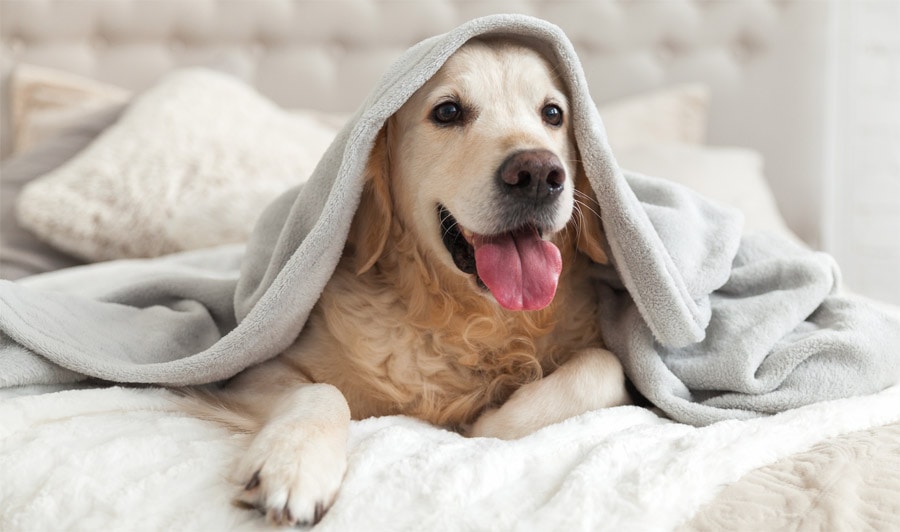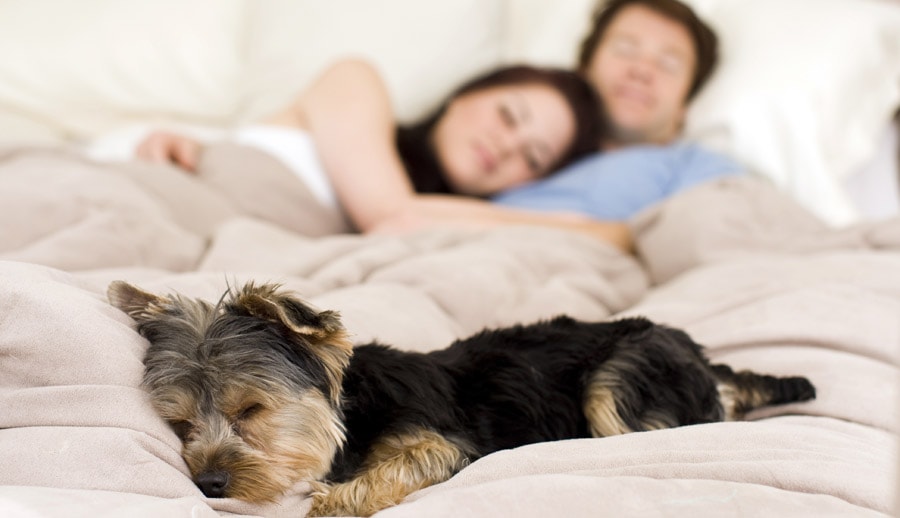How Many Hours a Day Do Dogs Sleep? How Much do They Need?

Good question: how many hours a day do dogs sleep? Some people think their dogs sleep all day, and others think they are eternally awake! Much depends on the breed, so how much do they need? How much sleep does a dog need in order to be alert and active during their non-sleeping hours?
Dogs doze a lot for relatively short periods, unlike human beings who tend to take their sleep in one roughly 8-hour period – usually at night. While humans sleep for about 1/3 of their day, dogs tend to sleep a total of 50% – 60% of their day, some even more. Larger breeds, such as St. Bernards, Newfoundlands, mastiffs, Irish wolfhounds, etc, sleep for longer than smaller breeds, this generally being in the form of naps – the larger the breed the more naps they tend to take.
However, dogs need more sleeping time than humans in order to get the right amount of restorative REM sleep. Because of the preponderance of naps, they tend to take, REM sleep (the most restorative kind of sleep) takes up only around 10% of their sleeping time. So they need more sleep to feel restored and ready to chase cats, sticks, and balls again.

Dogs do not sleep according to a schedule as humans do, but whenever they feel like it. They are active around 20% of a day, and spend around 30% awake, lying or padding around. However, unlike humans who take a while to wake up properly, they can be instantly awake, alert and ready for action if the doorbell rings or mail comes through the door. They can even sense the mailman or woman approaching their house, and are ready and waiting for their opportunity to remove a finger or two!

Working dogs tend to sleep less than pets. Dogs that work on farms, or police or army dogs, have less time to lie around, and they tend to sleep less than dogs kept as pets. While it makes sense to believe that working dogs should sleep more than dogs kept as pets, this is not the case. They tend to sleep less than dogs that are kept in the house all day with nothing to do but sleep or get into mischief!
This is because dogs that work have to be physically fir and also mentally alert. Police and army dogs are often called into action at a moment’s notice with one command. Such dogs must be attentive and ready for action when awake, and dogs trained to do so will be less likely to sleep as much as house dogs. If the dog is given a job that involves it keeping its attention on what it is doing, it is less likely to take sleep, or even take a nap. Eventually, when time is available, the working dog will nap or even sleep for a protracted period while it catches up with the sleep it has lost while on duty.
You should be aware of your dog’s regular sleeping habits to the extent that you will notice when these suddenly change. If your dog is normally sleeping or napping most of the time, then suddenly starts becoming very active, then it’s wise to contact your vet for a quick checkout (your dog, not you.)
Similarly, if you have a very active dog that suddenly falls asleep all the time, then it may need veterinary attention. Dogs that suddenly change their sleeping habits from less to more, or vice versa, may have thyroid issues, breathing or heart problems, or might simply be on the wrong diet for its breed, size, and age. It’s always best to get a professional opinion in such cases.

A dog has sleeping cycles just as a human does. As they fall asleep, they begin in a slow wave and as this progresses their breathing and heart rate become slower and their blood pressure drops. After around 10 minutes, they enter REM sleep, again just as humans do. You should be able to see their eyes moving under their eyelids. Dogs react to dreams just as humans do: they may whimper, twitch and occasionally even bark. This may wake them up, but they usually stay asleep. Humans remain in REM sleep for around a quarter of their sleeping time, REM phase sleeping by dogs is only around a tenth of their sleeping time.
People reading our blog often ask questions about beds, mattresses, and pillows, but many are also interested in other topics we occasionally discuss on our site. Here are some of those which relate to dogs and general canine sleeping behavior.

If you have read our post above you will understand that dogs sleep or nap more than humans. They will tend to nap much more frequently than you, so the likelihood is that you are just noticing what is normal for a dog. However, if your dog displays other symptoms or has suddenly started napping or sleeping much more frequently or for longer than usual, then contact your vet immediately.
Not necessarily. In fact, if the dog shows no other symptoms when awake, then it probably just dreaming. Many animals, including dogs, can dream as we do and a dog can move around, whimper or even bark when in a dreaming stage of sleep. There is no need to do anything unless this occurs continually when you should call a vet to put your mind at rest.
If your dog’s sleep pattern has changed and it sleeps now more than it used to, then it could be hypothyroidism. The thyroid generates hormones that regulate the animal’s energy levels, and if it is not generating enough the dog will tend to sleep more. You need to take it to a vet for confirmation. There is no cure, but hormone supplements should bring your dog back to normal. Working dogs may sleep more if they have been working hard, and large dogs might appear to sleep longer if they have been very active during the day.
If your dog has had insufficient exercise, it will pace about to work off its excess energy. More commonly, however, a dog will pace about if it is stressed or unhappy. Maybe you do not let it out enough. If your dog is pacing, take it out and let it run about and play. It may also pace about if it needs to pee. Some dogs will whine at the door, so either let it out or take it out. If this doesn’t work, then refer to a vet.
It depends on the animal. Cats sleep 12 – 16 hours a day, horses just under 3, elephants 2 and cows 4. So animals can sleep more than humans – or less! You don’t want your dog sleeping like elephants! Dogs also dream.
The simple answer is 12 – 14 hours a day. However, unlike humans, they spread these hours out over the day. Dogs tend to take naps rather than protracted periods of sleep as humans do. Once you are aware of your dog’s normal sleeping habits, it should be fairly easy for you to notice when this changes. This could indicate that there is something wrong with your dog. You should then contact a vet.
Donald Edwards is a sleep research expert with a deep knowledge of sleep and sleeping difficulties. He is a senior writer whose expertise and compassionate approach to establishing the fundamental causes of your sleeping issues enables us to help you to get the best night’s sleep possible and wake up fully refreshed for the day to come.
Medical Disclaimer: By using the insidebedroom.com website and/or purchasing any products or services through this website, you are voluntarily agreeing to this Disclaimer. You are agreeing that you have read, understand, and consent to the terms herein.
The information and other content found on this website, or in any linked references, are not intended to be expert medical advice and should not be construed as such. No information on this site, including written text, images, graphics and any other form of information, is intended to be a substitute for professional medical advice, treatment or diagnosis, but is intended for informational purposes only. If you need any form of medical advice or information, then refer to your physician or other medical expert.
Leave a Reply